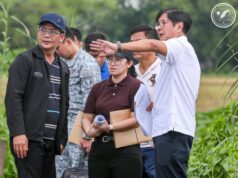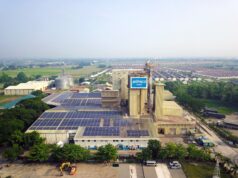CLARK FREEPORT – Economist Bernardo Villegas told the Kapampangan business sector here that their “cabalen” former Pres. Arroyo left as legacy an economic direction in the right path, as he appealed to Pres. Aquino to build up on this through Charter change exclusively to amend outdated economic provisions.
“We have the most backward Constitution,” Dr. Villegas told members of the Pampanga Chamber of Commerce and Industry (Pamcham) in its 35th general membership meeting here.
Villegas, who is senior vice president and dean of the School of Economics of the University of Asia and the Pacific, expressed positive outlook for the economy of the Philippines in the coming years, saying that at least seven percent annual economic growth can be sustained under the Aquino administration.
He gave credit to this to former Pres. Estrada whom he credited with shifting economic policies towards countryside development. This, he said, was sustained by Mrs. Arroyo by pursuing infrastructure projects in the provinces, particularly the establishment of a nautical highway through the “roll on-roll off” barges that boosted trade between the country’s islands.
“Before Erap (Estrada), our government despised agriculture,” he noted.
Villegas said that his positive outlook for the economy is also based on the “impressive” members of the President’s cabinet whose “common denominator is honesty.”
“They are the right people,” he said.
Villegas said, however, that while he is optimistic on the Philippine economy amid developments slowing down economies in the West, the country would not be able to level up to the progress of neighboring countries such as Vietnam and Indonesia unless it opens doors to more foreign investments.
Noting that the Constitution limits foreign investments to only 40 percent and bars them from owning lands, Villegas urged the Aquino administration to scrap this ceiling in a Constitutional assembly by 2013. “It’s ironical that we call our economy capitalist,” he said.
“Of course there should be some limitations on foreigners, but why should we bar them from owning lands where they could build factories and homes?” he asked.
Villagas urged the Aquino government to convene a Constituent assembly, and not a Constitutional convention to be able to amend solely the outdated economic provisions in the Constitution.
“In a way, this was done during the Estrada administration when a group of 30 people came out with such amendments contained in 300 pages,” he said. Nothing came of this as Estrada was overtaken by “People Power”.
With the right economic provisions in place, the Philippine economy would grow and by the time Aquino steps down from power in 2016, the government would be in better position to amend other parts of the Charter through a constitutional convention, he said.
Villegas said that that the decline of “advanced countries” such as the US and other countries in Europe seemed inevitable amid what he called “rising markets”, including Vietnam, Indonesia and the Philippines.
“We have the most backward Constitution,” Dr. Villegas told members of the Pampanga Chamber of Commerce and Industry (Pamcham) in its 35th general membership meeting here.
Villegas, who is senior vice president and dean of the School of Economics of the University of Asia and the Pacific, expressed positive outlook for the economy of the Philippines in the coming years, saying that at least seven percent annual economic growth can be sustained under the Aquino administration.
He gave credit to this to former Pres. Estrada whom he credited with shifting economic policies towards countryside development. This, he said, was sustained by Mrs. Arroyo by pursuing infrastructure projects in the provinces, particularly the establishment of a nautical highway through the “roll on-roll off” barges that boosted trade between the country’s islands.
“Before Erap (Estrada), our government despised agriculture,” he noted.
Villegas said that his positive outlook for the economy is also based on the “impressive” members of the President’s cabinet whose “common denominator is honesty.”
“They are the right people,” he said.
Villegas said, however, that while he is optimistic on the Philippine economy amid developments slowing down economies in the West, the country would not be able to level up to the progress of neighboring countries such as Vietnam and Indonesia unless it opens doors to more foreign investments.
Noting that the Constitution limits foreign investments to only 40 percent and bars them from owning lands, Villegas urged the Aquino administration to scrap this ceiling in a Constitutional assembly by 2013. “It’s ironical that we call our economy capitalist,” he said.
“Of course there should be some limitations on foreigners, but why should we bar them from owning lands where they could build factories and homes?” he asked.
Villagas urged the Aquino government to convene a Constituent assembly, and not a Constitutional convention to be able to amend solely the outdated economic provisions in the Constitution.
“In a way, this was done during the Estrada administration when a group of 30 people came out with such amendments contained in 300 pages,” he said. Nothing came of this as Estrada was overtaken by “People Power”.
With the right economic provisions in place, the Philippine economy would grow and by the time Aquino steps down from power in 2016, the government would be in better position to amend other parts of the Charter through a constitutional convention, he said.
Villegas said that that the decline of “advanced countries” such as the US and other countries in Europe seemed inevitable amid what he called “rising markets”, including Vietnam, Indonesia and the Philippines.



